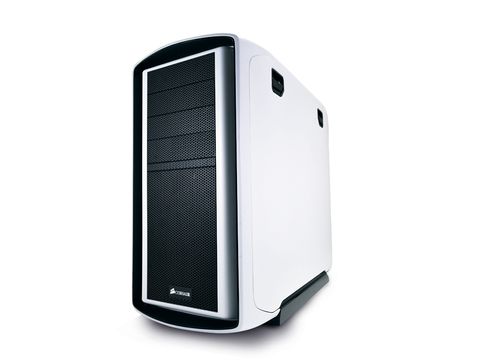TechRadar Verdict
Pros
- +
PCIe 3.0 mobo
- +
CPU & GPU overclocked…
- +
…and could be tweaked higher
- +
That case
Cons
Why you can trust TechRadar
We may have mentioned once or twice how much we like Corsair's Graphite Series 600T case. Not only did we give it 4.5/5, we stuck it on last issue's cover too. If any system is going to win us over, this is the outfit to do it in.
But by the same principle that got Susan Boyle recording contracts and Wayne Rooney a career in professional football, it's what's inside that counts. Do the components inside deliver the goods, or is the pretty case a distraction from a mediocre build?
Categorically, yes they do and no it isn't. The AT-FX Polaris is a really powerful, future-proofed, well-cooled, highly overclockable machine that manages to keep a reasonable price tag despite some fairly luxurious features.
The feature-rich ASRock Z68 Fatal1ty Pro Gen3 is a worthy motherboard for this rig. Its most enticing feature, in our opinion, is PCIe 3.0 compatibility. It offers not only a bit of future-proofing peace of mind by means of compatibility with PCIe 3.0 graphics cards further down the line, but also improves the performance of PCIe-based flash storage drives such as the OCZ Revo Drive.
There's still no word on when we may see PCIe 3.0 graphics cards, but then we're waiting for Ivy Bridge for that fun to begin in earnest.
Fatal-one-tified
As you might expect from a board endorsed by a rather famous pro gamer, there's an emphasis on overclocking, too. Along with an all-in-one auto-overclocking program that tweaks everything from memory frequency to fan speeds, there wellare gold capacitors and huge heatsinks over both bridges and PLL.
You're not starved for USB 3.0 or SATA 6Gbps ports either. That sets the stage nicely for a graphics card and CPU both ripe with overclocking potential. Advancetec has pumped the i5 2500K in this rig up to a very respectable 4.8GHz, and the overclocked KFA2 GTX 580 runs incredibly cool at 48ºC under load, especially considering that GF 110 core's running at 800MHz.
Out of the box, the 1TB hard drive and 60GB Corsair F60 SSD are set up in a Smart Response array, which is becoming increasingly popular among system builders and with good reason – it's a great way to bridge the gap between solid state and magnetic platter storage while keeping costs down by opting for a smaller SSD; 60GB is more than enough capacity to work as an effective cache device.
In all areas, the AT-FX Polaris delivers with bags of power. So how does it measure up against the competition?
TechRadar Labs

CPU rendering performance
Cinebench R11.5: Index: Higher is better
AT-FX Polaris: 7.80
Phoenix Hydro X: 7.84
DirectX 11 tessellation performance
Heaven 2.5: Frames per second: Higher is better
AT-FX Polaris: 21.7
Phoenix Hydro X: 38.4
DirectX 11 gaming performance
Shogun 2: Frames per second: Higher is better
AT-FX Polaris: 47.5
Liquid i7 High: 48.8
Well, it's a hugely more enticing option than the last rig we looked at from Advancetec, the AT-FX Tron, priced almost identically.
Last month's Liquid i7 High from Cyberpower arguably offers better value with the inclusion of a screen and peripherals, but if you're already set for those then we think the Polaris matches it in the components department, considering the overclocking and cooling on offer.
The current cream of the sub-£1,500 crop is still Palicomp's Phoenix Hydro X, offering an i7 2600K and two 2 GB HD 6950s.
Advancetec's Polaris is cheaper though, and ideal for any gamer who can afford it.
Follow TechRadar Reviews on Twitter: http://twitter.com/techradarreview

Ad creative by day, wandering mystic of 90s gaming folklore by moonlight, freelance contributor Phil started writing about games during the late Byzantine Empire era. Since then he’s picked up bylines for The Guardian, Rolling Stone, IGN, USA Today, Eurogamer, PC Gamer, VG247, Edge, Gazetta Dello Sport, Computerbild, Rock Paper Shotgun, Official PlayStation Magazine, Official Xbox Magaine, CVG, Games Master, TrustedReviews, Green Man Gaming, and a few others but he doesn’t want to bore you with too many. Won a GMA once.

